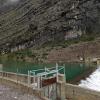News
Displaying Results 76 - 100 of 205
Research on and monitoring of the effects of air pollution on different environmental media and health has been carried out for more than four decades under the UNECE Convention on Long-range Transboundary Air Pollution. The data and research that has emerged from these efforts is unique as it…
How can regional and international cooperation be fostered in a region that faces unprecedented water scarcity? How can the benefits of this vital resource be shared to increase resilience to climate change?
The Third Baghdad International Water Conference titled "Water Scarcity, the Mesopotamian…
Air pollutants are not only harming human health and the environment but are also degrading surfaces of historical buildings and monuments. Corrosion and soiling of cultural heritage sites as a result of air pollution can lead to severe economic losses as a result of high maintenance and…
Young professionals from industry, academia, and civil society came together to discuss and explore solutions for sustainable resource management at the UNECE Resource Management Week 2023. Hosted by the UNECE Resource Management Young Member Group (RMYMG), the highly interactive session provided a…
Uzbekistan is one of the world's largest producers of gold and uranium. In the last 40 years, Uzbekistan has built a strong mining industry, which is expected to grow in the years to come, given that only 20 % of the country’s territory has yet been explored. The expected rise in the number and…
Experts from Albania and Montenegro met in Shkoder (Albania) on 25 April 2023 to progress with the exchange of information on the shared Cijevna/Cem River. This was the second meeting of the joint technical group on monitoring and assessment established upon recommendation of the Implementation…
In a move towards sustainable resource management, several countries have presented case studies of how the United Nations Framework Classification for Resources (UNFC) can scale-up harmonized resource management. UNFC provides a common language and standards for the classification of all energy…
Artificial intelligence (AI) is becoming more prominent in the world that surrounds us even if it has existed for a good deal of time. The Internet search engines have been using AI to identify articles that correspond with our search, enabling product advertisers to correlate their marketing with…
The massive use of fertilizers and the production and use of manure in agriculture over the past 100 years have led to significant reactive nitrogen emissions to air and releases to water and land. Burning of fossil fuels (in vehicles, power plants and industry) is another source of reactive…
Prevention of and preparedness for industrial accidents require special attention in Tajikistan, a country with a strong mining industry. The mountainous terrain of mining sites makes them highly susceptible to earthquakes, mudflows and floods, which can provoke Natech events (natural hazards…
A recent study published in The Lancet found that almost the whole world's population was exposed to unsafe levels of air pollution in 2019, with only a mere 0.001 percent breathing air that contains fine particulate matter (PM2.5) at concentrations lower than what the World Health Organization…
What are emission inventories and what purpose do they serve? Why is it important to develop emission inventories? If you don’t know the answer to these questions, you might be interested in taking the e-learning course on How to report emissions under the Convention on Long-range Transboundary Air…
Industrial safety and the prevention of accidental water pollution were high on Kazakhstan’s agenda this week, with the Second Meeting of the Inter-institutional Working Group on Tailings Safety and the Prevention of Accidental Water Pollution (IIWG).
The meeting brought together more than 60…
While companies and stakeholders across industries will not tire to make promises that include their willingness to become more transparent, we still see little actual progress. Research by Deloitte has shown that 65% of procurement leaders across sectors have limited or no visibility beyond their…
While the impacts of air pollution on vegetation and crops are sometimes overlooked, they can take a high toll on food production. As the food and energy crises have recently shown the vulnerability of our food systems, the impacts of air pollution on agricultural yields and food production should…
Joint efforts to harmonize data collection, strengthen monitoring and data exchange on water quality, develop early warning systems on water pollution at transboundary waters and improve collection and sharing of data on transboundary aquifers are needed for effective regional cooperation in…
Standards touch nearly every aspect of our daily life through all the products that we use and consume each day (for example, mobile phones, vehicles, cleaning products, personal protection equipment, toys, and others). When they are produced or introduced on the market, products are checked for…
According to the latest data available reported by the Organization for Economic Co-operation and Development (OECD) in 2019, imports of fake products into the European Union (EU) were up to around 6.8% of all imports. The same year worldwide, counterfeit and pirated merchandise amounted to USD 509…
With climate and biodiversity loss heading the news these days, another problem related to the planet we all share is often forgotten: air pollution. Air pollution has an enormous burden on public health, ecosystems, climate, and ultimately, the economy. Globally, the World Health Organization (…
During its recent mission in Turkmenistan, a UNECE delegation presented a proposal for a new analytical project - “Trade and Innovation for Sustainable Development of Turkmenistan” - to the government and international stakeholders, aimed at supporting the country to enhance innovation governance…
“It's now or never, if we want to limit global warming to 1.5°C”, stated the IPCC authors earlier this year. “Without immediate and deep emissions reductions across all sectors, it will be impossible”, they continued.
With worsening climate effects all over the world, all eyes turned to COP27…
The transition from linear to circular economies requires fundamental rethinking of trade policies and regulations. “Harmonized System” codes (HS codes) are a key pillar of the tariff infrastructure for international trade. These HS codes were designed at a time when circular economy considerations…
Technologies can enhance commerce if clear international standards are in place to ensure that their use is harmonized between trading partners, and if there is regulatory coherence among countries.
Ways in which digital and green transformations can improve quality infrastructure for trade in…
The global economy must be urgently steered away from unsustainable production and consumption patterns, which fuel the climate crisis, deplete natural resources and negatively impact both people and the environment. Global value chains are predominantly linear in nature, and the lack of…
Premature mortality attributable to poor air quality results in high costs. For example, a study by WHO and OECD estimates that in 2010 costs of air pollution related premature deaths in Georgia were at about 9 billion USD. The main sources of air pollution are the transport and agricultural…


























